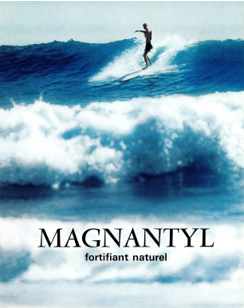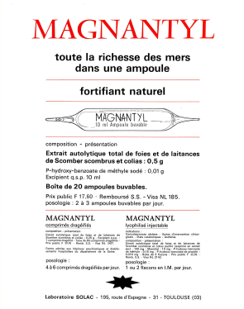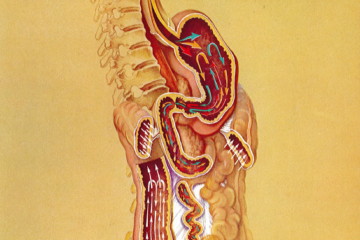The use of fish-derived products was not uncommon in the 1970s. Magnantyl was made from a total autolytic extract of the liver and soft roe of two mackerel species Scomberscombrus (Atlantic mackerel) and Scombercolias (Atlantic chub mackerel). The drug was prescribed as a natural fortifying agent, to recover after a surgery and to facilitate convalescence. Both a solid oral form and a drinkable ampule-based form were proposed.
Mackerels of the genus Scomber are commercially important species. These fishes are rich in saturated (SFA) and importantly in long-chain polyunsaturated fatty acids (PUFA). Omega-3 (Ω-3/ω-3) PUFA such as docosahexaenoic acid (DHA) and eicosapentaenoic acid (EPA) are essential nutrients throughout the life span. They have anti-inflammatory roles and show a beneficial effect on the cardiovascular system and other organs. An ω-3 PUFA supplementation can improve lipid metabolism and endothelial function during convalescent healing after acute myocardial infarction. They can also improve patients nutritional state, reinforce the recovery of gastrointestinal function and shorten patient recovery time. They are recommended as part a healthy dietary regime. They are also important in youth, representing a potential protective factor of neurodevelopmental disorders. For these reasons, a fish oil supplementation was sometime recommended or prescribed.
Unfortunately, the contamination of mackerel liver by microplastics can occur. The presence of microplastic particles in the digestive tract of Atlantic chub mackerel (S. colias) has been regularly observed. Nowadays, purified ω-3 PUFA supplements are preferred over total fish extracts.
A man surfing a wave provides a well-apropos illustration for this sea-derived drug used as a fortifying product.




